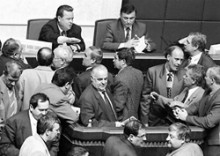There is an intriguing aspect about the interim commission of inquiry investigating former Speaker Tkachenko. It was formed by a resolution passed almost unanimously early at the first sitting of the parliamentary majority on January 21. And as its report was submitted on Tuesday May 16, the lowmakers practically unanimously declined to hear it out when the reporter asked for additional time. Commission chairman Yaroslav Kendzior did not hide his frustration; he had expected more interest from the colleagues.
In an interview with The Day he said, “I don’t think there will be 226 People’s Deputies wishing to dot the i’s and cross the t’s in the Tkachenko case.” The trouble is that the commission worked too hard and dug too deep. Among the names figuring in its findings are some belonging to the current majority — nothing criminal, just petty transgressions, yet the fact alone creates a certain atmosphere. In any case, the commission is expected to be dissolved soon.
It is also a fact that the need to hear the Kendzior Commission’s findings was previously discussed by a sitting of the majority factions and groups. Leonid Kravchuk, Chairman of the Coordinating Committee, told The Day, “We came to the conclusion that we must not keep secret from the electorate any actions of any member of the Verkhovna Rada. In my opinion, the idea that one should not wash lawmakers’ dirty linen in public is wrong. On the contrary, we must not keep such facts secret the people, because the People’s Deputies are actually paid their voters’ money and the electorate has a right to know how this money is being spent.”
Yaroslav Kendzior’s May 16 report became one more precedent in the history of the independent Ukrainian Parliament. “When I became Speaker I opposed all attempts to audit my predecessor, Chairman of the Verkhovna Rada Ivan Pliushch, on principle,” former Speaker Oleksandr Moroz stressed. Nor did Speaker Tkachenko audit his predecessor.
In his report Yaroslav Kendzior listed only some of Tkachenko’s actions which the commission considered transgressions. He mentioned sums spent by Oleksandr Tkachenko on certain things, ranging from food to entertainment to a detailed cost accounting of the property purchased by the former Speaker for his dacha. All told, some UAH 50 million from the legislature’s budget was spent for purposes other than the ones designated, which can be considered wrongdoing. Deputy Mykola Kyrychenko, however, believes “the commission has no right to identify Oleksandr Tkachenko’s actions or say what was right or wrong about them. Such an assessment is the prerogative of the competent authorities.”
In an interview with The Day Communist Heorhy Kriuchkov stated, “Some of the facts cited by Mr. Kendzior date to the period when Ivan Pliushch was Speaker. Besides, the amount spent by Oleksandr Tkachenko, for example, on improvements at his dacha cannot be even compared to what was spent by other ranking Ukrainian officials. I was ashamed to watch all this in Parliament and I am seriously worried about what will happen to Verkhovna Rada and the parliamentary system as a whole.”
Interestingly, he is echoed by a large part of the majority. Dmytro Tabachnyk, for one, noted, “Kendzior is a professional lawmaker. He is in Verkhovna Rada for a second or even third term. Why should he scandalize the very foundations of the parliamentary system which made it possible for him to become a politician and get a good job in Kyiv rather than return to Lviv where all he did was teach physical culture and sports? One could draw a parallel with mammals; there are several species that destroy their own natural habitat. I think even children know their names and I don’t think that they are called members of Parliament. Transgressions should be handled by special committees. Of course, they must be corrected. But we must not lower ourselves to washing dirty linen in Parliament. When Mr. Kendzior was reading from the parliamentary rostrum about how many carpets, tablecloths, forks, knives and so on were purchased by Mr. Tkachenko for his dacha, I really wasn’t sure was a little or a lot. The Premier might have 15 times as many at his dacha. We should hear not about the number of certain articles but about whether or not these articles were bought contrary to Verkhovna Rada budget regulations. In a word, what happened in Parliament today looked more like a squabble among undereducated housewives in a communal kitchen.”
So what happens in the end? Yaroslav Kendzior is practically sure that the commission findings will never be handed over to the Prosecutor’s Office, and that the commission will be disbanded. While its formation had a certain political tinge, the possibility of its dismissal is considerably farther from the political range. Oleksandr Tkachenko nevertheless tried to use precisely the political aspect. Even before Kendzior took the floor he proposed to put off hearing the report until Constitutional Court ruling on the legitimacy of the majority decisions made January-February of this year. As it happened, he needn’t have worried about the commission’s verdict. Most likely, the key to the mystery of this phenomenon is to be found in the lawmakers’ mentality rather than political motivation. In Yaroslav Kendzior’s words, the Deputies above all were driven by corporative interests, as both minority and majority members spoke in the former Speaker’s defense. Certain universal rules of the Ukrainian parliamentay community appear to exist, reaching over and above factions, groups, minority, and majority concerns. These rules prove effective throughout the natural habitat of creatures representing the Ukrainian People’s Deputy species. In fact, Mr. Kendzior finally admitted, “It’s apparently their collective parliamentarian mentality: so someone did something wrong; why wash dirty linen outside Parliament? Least of all hand it over to the Prosecutor’s Office so they can poke through other Verkhovna Rada dirty linen? Thus they will most of all want to close the subject, the sooner the better.”







